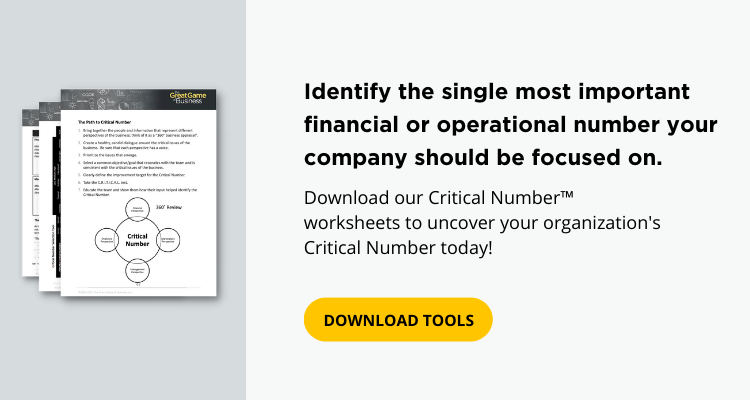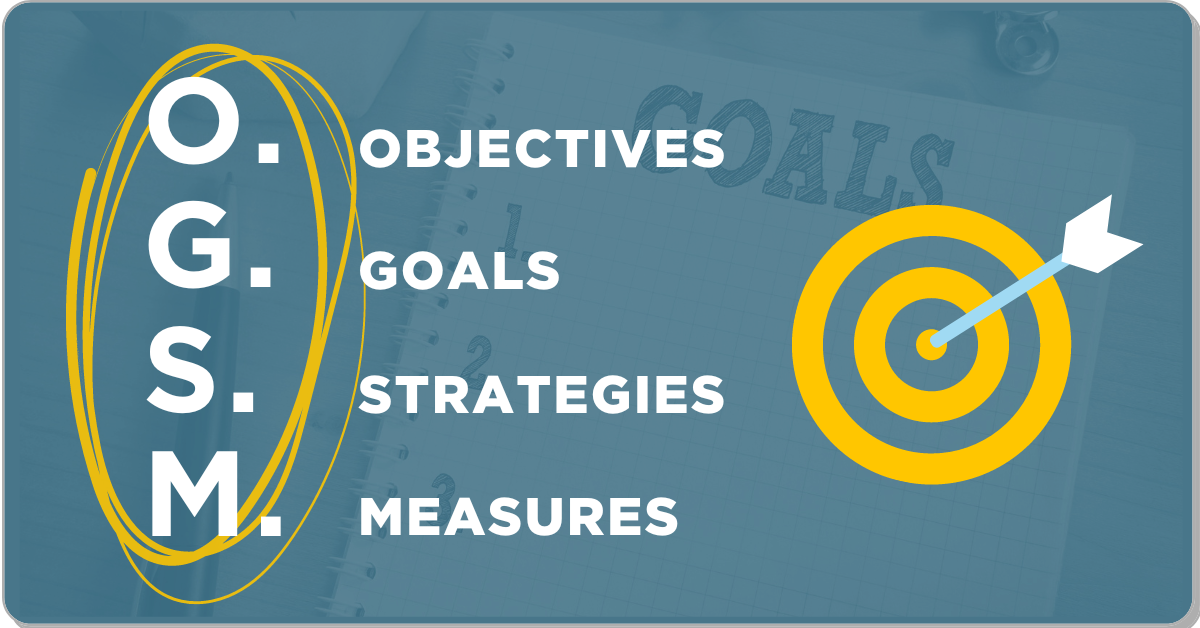
At The Great Game of Business, we are passionate about helping businesses achieve their fullest potential, and today, we want to share with you the importance of identifying the single most important goal your company should be focused on, and how aligning your employees to this goal is vital for success.
In today's fast-paced business world, it's easy to get overwhelmed with multiple priorities and initiatives. However, without a clear focus, your company can end up spinning its wheels, wasting valuable resources, and struggling to make meaningful progress. That's why identifying and prioritizing a single most important goal is a game-changer.
We're willing to bet right now that there is at least one financial or operational number at the heart of your business that, if improved in the short term, would dramatically affect your business. Do you know what that number is? Is your business currently working towards that number?
At The Great Game of Business, we call this number the "Critical Number™" in an organization. It is the number that, at any given time, will have the most significant impact on what you're doing and where you want to go. Exactly what it is will depend on a variety of factors: the kind of business you're in, the state of the economy, competitive conditions, your specific financial situation, and so on.
The Importance of Setting The Correct Goals for Your Company
Why must organizations identify the correct goal to bring focus around? Well, it's simple. Having a single most important goal provides clarity, direction, and purpose to your entire organization. It becomes a North Star that guides decision-making and helps employees stay on track. When everyone in the company is aligned towards a common goal, it fosters a sense of teamwork, accountability, and motivation, that will ultimately drive success.
But not just any goal will do. Choosing a goal that has a significant financial impact on the organization is crucial. This means focusing on objectives that directly contribute to your company's bottom line, such as increasing revenue, improving profitability, or reducing costs. These are the goals that truly matter and can make a tangible difference in your company's financial health.
Every company has a Critical Number. Your Critical Number may have to do with sales, cash flow, quality, recruitment, operating costs, or a dozen other factors. Whether you're aware of it or not, it will make or break your company. It is the number you have to do well on if you are going to succeed, or maybe even survive. So it's vital that you identify it and come up with standards people can use to go after it.
How To Identify The Financial or Operational Number Most Important to Your Company
The good news is that it’s generally pretty easy to track down your Critical Number, assuming you know your business reasonably well.
Two Considerations when trying to identify your Critical Number [Most Important Company Goal]:
1. Pay attention to what keeps you up at night.
2. Better yet, ask your people what keeps them up at night.
If you're in the pit of a recession, all of you no doubt lie in bed worrying about sales. That's probably where you'll find your Critical Number. Or suppose you have a temporary services company and your business is going gangbusters. Then the number is more likely to involve, say, finding and keeping good employees. Or something may have happened to your company that makes one area of the operation particularly important.
Further Narrowing Your Critical Number
If you feel that your company has many urgent challenges, it can be difficult to sift through the scads of metrics that might be worthy of your undivided attention. So how do you discover the select few that will truly make a difference? Ask yourself the below questions to help narrow down potential company goal(s)/Critical Number(s):
- Are there considerations related to your specific business model that are absolutely critical to ongoing success? For instance, if you are the low-price leader, then the cost of sales is likely a primary area of focus.
- Are there challenges your business faces right now that deserve attention? Examples might include issues like declining quality, too much dependence on one large customer, or a high employee turnover rate.
Example of An Organization's Critical Number
When the Kroger supermarket chain went private, for example, it took on an enormous amount of debt. Whenever a company borrows on that scale, cash becomes king. So the company gave all the store managers a lot of stock and told them that if they wanted to see the stock appreciate, they should focus on cash flow. Did they ever!
They kept inventories low. They held off investments in capital equipment. They negotiated terms with their suppliers. They deposited their receipts quicker. As the company generated cash, it paid off its debt, and the stock shot right through the ceiling. We were in a similar situation after the buyout, but since then, we have tended to focus on our Cost of Goods Sold (COGS), which is our Critical Number under normal circumstances. That's where almost all the action occurs in our business.
To know what's really going on, we have to look at all the different factors that affect the COGS line on the Income Statement, and monitor all the different variances. On the other hand, we also have to be aware that circumstances may change, sometimes abruptly, and bring another Critical Number to the fore. We've had periods, for example, when sales have taken off and we've had trouble absorbing the new work coming in. At times like that, you have to be very careful that you don't run out of cash. So the number we watch most closely is sales.
Connecting Employees To The Company's Goal
When you define the Critical Number, you define what winning looks like for the organization. Now all you have to do is rally employees around your Critical Number and connect them to a strategy that gets them to that winning destination. This part is crucial. The company's Critical Number is worthless if nobody in the organization knows about it or understands it.
So how do you ensure that your employees are aligned to the single most important goal? It starts with communication and transparency. Clearly communicate the goal to your entire organization and explain why it's important. Make sure that every employee understands how their individual work ties into the larger goal and how their contributions are crucial to its achievement (we call this line-of-sight). Provide regular updates on progress and celebrate milestones along the way to keep motivation high.
In addition, consider implementing an open-book management approach, where employees have access to financial information and are encouraged to understand and contribute to the company's financial performance. This empowers employees to make informed decisions and take ownership of their work, knowing that their efforts directly impact the company's success.
So in short, to connect people to the company goal:
- Identify the company goal/Critical Number
- Clearly communicate the goal and why it's important
- Educate employees on how they impact the goal
- identify actions people can take to influence the goal (identify the right drivers)
- Assign responsibility for executing these actions
- Put the company goal on a scoreboard for all to see
- Track the company's progress
- And most importantly, be sure to move employees in the right direction
- Celebrate every win along the way!!
The Negative Impact of Chasing The Wrong Goals
What happens if your company is focusing on the wrong goal? The downfall of chasing a goal that doesn't have much financial impact on the organization is that it can be a distraction. It's easy to get caught up in chasing vanity metrics or pursuing initiatives that are not directly tied to your company's financial success. This can lead to a waste of time, money, and resources, without delivering meaningful results.
For example, let's say your company's single most important goal for the year is to increase revenue by 15%. This goal is directly tied to your company's financial success and has a clear impact on the bottom line. It will drive employees to focus on sales, customer retention, and other revenue-generating activities. Whereas, if your company's goal is to simply increase social media followers or launch a new website, these initiatives may not directly contribute to financial success, and may end up being a distraction from the true priorities. However, if your company's Critical Number was to increase new business by 20% due to a large percentage of your company's revenue coming from one client, increasing social media followers might be a strong tactic for gaining that new business.
In conclusion, identifying the single most important goal and aligning employees to it is a powerful strategy for driving success in your company. It provides clarity, direction, and motivation, and ensures that everyone is working towards a common objective. However, it's essential to choose a goal that has a significant financial impact on the organization to avoid distractions and focus on what truly matters. So, set your sights on a clear and meaningful goal, communicate it effectively, and watch your company thrive! Remember, at The Great Game of Business, we are here to help you succeed every step of the way. If you want to hire a business coach to help identify your critical number and align your team around a common goal, just give us a call!
Schedule a call with us to get matched with a coach
More Articles You Might Like:
.png)
















